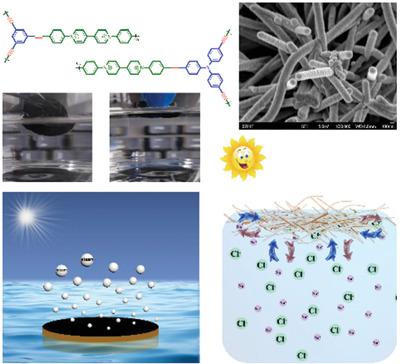当前位置:
X-MOL 学术
›
Macromol. Rapid Commun.
›
论文详情
Our official English website, www.x-mol.net, welcomes your
feedback! (Note: you will need to create a separate account there.)
Salt‐Rejection Solar Absorbers Based on Porous Ionic Polymers Nanowires for Desalination
Macromolecular Rapid Communications ( IF 4.2 ) Pub Date : 2020-11-25 , DOI: 10.1002/marc.202000536 Fei Wang 1 , Zhentao Hu 1 , Yukang Fan 1 , Wei Bai 1 , Shujuan Wu 1 , Hanxue Sun 1 , Zhaoqi Zhu 1 , Weidong Liang 1 , An Li 1
Macromolecular Rapid Communications ( IF 4.2 ) Pub Date : 2020-11-25 , DOI: 10.1002/marc.202000536 Fei Wang 1 , Zhentao Hu 1 , Yukang Fan 1 , Wei Bai 1 , Shujuan Wu 1 , Hanxue Sun 1 , Zhaoqi Zhu 1 , Weidong Liang 1 , An Li 1
Affiliation

|
The construction of photothermal materials with ideal salt tolerance has been a major subject for efficient solar desalination. Herein, a novel photothermal material based on porous ionic polymers (PIPs) nanowires is synthesized by Sonogashira‐Hagihara cross‐coupling reaction using ionic salt and alkynylbenzene as building blocks. The PIPs nanowires monolith shows abundant porosity with low density, leading a superior thermal insulation. The intrinsic superhydrophilicity of PIPs nanowires endows it with desired water transportation ability. By facile spraying Chinese carbon‐ink on the PIPs nanowires monolith, its light absorption can be enhanced to be 90%. Based on these merits, the PIPs nanowires based photothermal materials show high solar energy conversion efficiency (81% under 1 sun irradiation). More interestingly, its inherently ionic framework can result in an ion–ion interaction between the external ions in water and ionic groups in PIPs framework, thus leading to excellent desalination ability by combing its unique superhydrophilicity, for example, no salt accumulation is observed after 6 h duration at 1 sun irradiation. Compared with the existing salt‐resistant photothermal materials, the method takes the advantage of the intrinsically ionic feature of PIPs without using any artificial process, thus may open a new way for design and fabrication of high‐performance salt‐rejection photothermal materials.
更新日期:2020-11-25











































 京公网安备 11010802027423号
京公网安备 11010802027423号